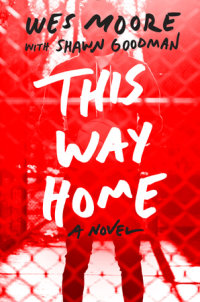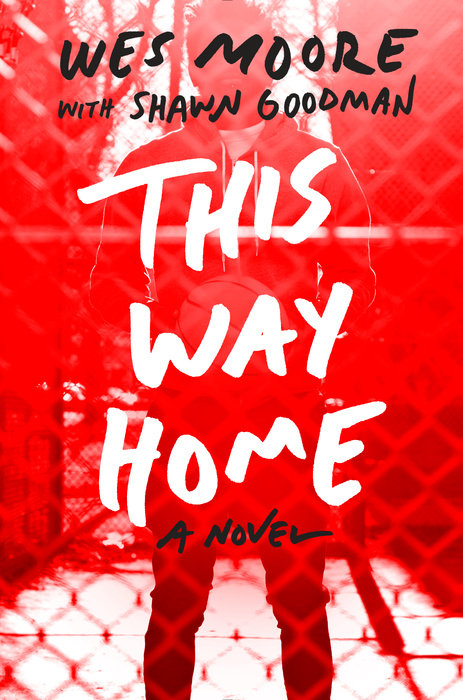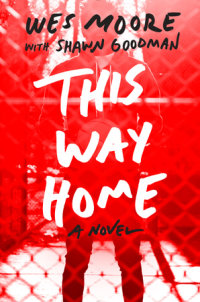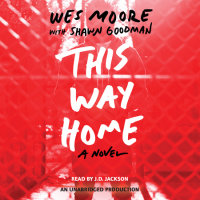This Way Home
Author Wes Moore Shawn Goodman
“Brimming with hard realities about the choices we make, the friendships we keep, and the unlikely allies we find along the way, this affecting novel helps to fill the gaping hole left by Walter Dean Myers’s passing.” —Booklist
“A taut, haunting tragedy.” —Kirkus Reviews
One young man searches for a place to call home in this gut-wrenching, honest novel from New York Times bestselling author Wes Moore and cowriter Shawn Goodman.
Elijah Thomas knows…
“Brimming with hard realities about the choices we make, the friendships we keep, and the unlikely allies we find along the way, this affecting novel helps to fill the gaping hole left by Walter Dean Myers’s passing.” —Booklist
“A taut, haunting tragedy.” —Kirkus Reviews
One young man searches for a place to call home in this gut-wrenching, honest novel from New York Times bestselling author Wes Moore and cowriter Shawn Goodman.
Elijah Thomas knows one thing better than anyone around him: basketball. But when a sinister street gang, Blood Street Nation, wants him and his team members to wear the Nation’s colors in the next big tournament, Elijah’s love of the game is soon thrown into jeopardy.
The boys gather their courage and take a stand against the gang, but at a terrible cost. Now Elijah must struggle to balance hope and fear, revenge and forgiveness, to save his neighborhood. For help, he turns to the most unlikely of friends: Banks, a gruff ex–military man, and his beautiful and ambitious daughter. Together, the three work on a plan to destroy Blood Street and rebuild the community they all call home.
This Way Home is a story about reclamation. It’s about taking a stand for what matters most, and the discovery that, in the end, hope, love, and courage are our most powerful weapons.
An Excerpt fromThis Way Home
1
From the vantage point of an old, splintered bench, Elijah focused his attention on the far court action, which was looking radically different from the safe, organized competition of his high school games. A meaty guy with prison tattoos carried the ball like a battering ram to the hoop. Elijah winced as the guy plowed over a kid from the opposing team and nearly knocked him out of his Jordans. The kid groaned as he wiped at his bloody knees; of course, no one called a foul.
“Hey,” said Dylan, who was dressed in ridiculously oversized shorts and a T-shirt.
“Hey yourself,” said Elijah, his eyes still fixed on the game. The guy with the tats had just dunked over the head of the other team’s equally beefy center.
“Damn,” said Dylan. “Is that guy playing in Hoops?”
“Yep,” said Elijah. “And you’re going to be guarding him.”
“He looks like he just got out of prison,” said Dylan. “And you know what he was in for?”
“Tell me,” said Elijah.
“For killing the last skinny white boy who was stupid enough…
1
From the vantage point of an old, splintered bench, Elijah focused his attention on the far court action, which was looking radically different from the safe, organized competition of his high school games. A meaty guy with prison tattoos carried the ball like a battering ram to the hoop. Elijah winced as the guy plowed over a kid from the opposing team and nearly knocked him out of his Jordans. The kid groaned as he wiped at his bloody knees; of course, no one called a foul.
“Hey,” said Dylan, who was dressed in ridiculously oversized shorts and a T-shirt.
“Hey yourself,” said Elijah, his eyes still fixed on the game. The guy with the tats had just dunked over the head of the other team’s equally beefy center.
“Damn,” said Dylan. “Is that guy playing in Hoops?”
“Yep,” said Elijah. “And you’re going to be guarding him.”
“He looks like he just got out of prison,” said Dylan. “And you know what he was in for?”
“Tell me,” said Elijah.
“For killing the last skinny white boy who was stupid enough to guard him. Not everyone’s like you, you know.”
“Meaning?” said Elijah.
“Meaning I’m not six-four and carved out of steel. I don’t wanna be that dude’s next parole violation. No way.”
Elijah laughed and held a fake microphone in front of his friend’s face. “Strong words, Dylan. Anything else you’d like to say to your fans out there before you and your teammates become the first seventeen-year-olds to win the adult division of the biggest three-on-three tournament in the state?”
Dylan grabbed the imaginary mike and tapped it. “Is this thing on? Okay. I’m saying I just want to play ball and be a lover. You know what I mean? That’s my message to the young people of the world. That’s what I want to be known for, basketball and . . .”
“Sexual potency?” offered Elijah, returning the invisible microphone to his friend.
“Exactly. What you said.”
Elijah threw an arm around the smaller boy’s shoulders. “If that guy does kill you, make sure to draw the foul, okay? Coach Walters says we’ve got a real chance, but every point has got to count.”
Dylan squirmed out from under Elijah’s arm and tried, unsuccessfully, to get his bigger, stronger friend into a headlock. Eventually they settled down to resume watching the game.
“But seriously,” said Elijah. “What do you think about these guys? In case we do end up playing them.”
“That dude over there’s got no left,” said Dylan.
“And that one?” Elijah pointed at the guy with the prison tattoos, who had abandoned the game in favor of shoving one of his opponents. “Your ex-con friend.”
“Ha!” said Dylan. “He’s got a bad temper. Guys like him lose their focus when they get frustrated.”
“Then tell me how you’re going to frustrate him in the tournament.”
“I’m not,” said Dylan. “I’m gonna be home sick, watching you guys play on TV.” He coughed for effect. “I feel a cold coming on.”
Elijah shook his head. “You’re going to be right here doing your thing and getting inside his head with those fast, skinny legs and crazy dribbling skills. You’re going to make him run with you, which, of course, he can’t because he’s too big and stupid and bulked up. And then all we have to do is sit back and watch him self-destruct.”
“Whatever.” But Dylan smiled, because he understood. He got up off the bench and grabbed his ball. Then his pale, thin legs scissored expertly while he dribbled quick and low between them, the ball caroming off an invisible midpoint at exactly the right moment.
“That’s right,” said Elijah appreciatively. “You’re like a hyperactive metronome. Be the metronome.”
“The what?” said Dylan, not missing a beat with his dribbling.
“Never mind.” Elijah lunged low, but Dylan carried the ball a fraction of a second longer than usual and then pivoted away. He moved with uncanny speed onto an empty court, where they began their unique interpretation of practice, which consisted of endless variations of passing drills and set plays, and three dozen suicide sprints. When they finally stopped, sweat-soaked and exhausted, the sky had changed from dusk to full-on dark; everyone else had gone home.
Dylan pointed toward his mother’s car. “You want a ride? My moms said she’ll take us to McDonald’s for milk shakes.”
“No, thanks,” said Elijah. “I’m going to get a run in.”
“Why?” Dylan stuffed his ball into his duffel bag.
“Got to get strong,” said Elijah.
“But you’re already strong,” said Dylan. “I mean, not as strong as me, but you know . . .”
Elijah nodded, holding his fist out for a bump. “Thank your mother for me.”
Once he was alone, he shook out his legs and then leaned against the chain-link fence to stretch. His calves and quads were sore, but the good kind of sore, the kind that meant he’d worked hard and pushed himself. The kind that meant he was getting stronger. He scanned the parking lot, which was empty except for a lone figure, arms crossed over his chest as he stood next to a black Mercedes with gleaming, oversized rims. The guy wore a dark hoodie that hid his face.
Elijah shouldered his pack and started jogging, past the overflowing trash cans and broken playground equipment. Past the padlocked bathrooms, and bicycle racks shackled with rusted, cannibalized frames, their seats and wheels and derailleurs long since stripped away and sold. He tried not to look back at the car but couldn’t help it; the figure was still there staring intently. Now nodding to him. So who the hell was he? A mysterious ballplayer with a nice car and nowhere to go? A drug dealer? Gang recruiter?
Something worked loose from Elijah’s memory, a piece of a conversation he’d overheard in school about a new gang that was trying to out-murder the other gangs. He hadn’t paid attention at the time because he lived where the neighborhoods were still safe and good, just east of the park known as the Battlegrounds. But now he wished he could remember something useful about what he’d overheard, at least the gang’s name. What did they call themselves? Blood something. Blood Street Nation, that was it. Christ, he thought. Some name.
Elijah returned the nod and then broke into a loose, easy stride in the direction of his home. He didn’t look back again.
2
The run home from the Battlegrounds was one of Elijah’s secret pleasures. He wouldn’t have admitted it, but the freshly painted houses and well-tended lawns made him feel inexplicably happy. He loved the big inviting porches with wicker furniture, and toys scattered everywhere: yellow plastic Wiffle bats, skateboards, and toy guns. And the trees, some of which were a hundred years old, anchored by strong, invisible roots. It was like his neighborhood had wrapped itself around its families, promising a lifetime of good things, like backyard barbecues and graduation parties.
Elijah knew it wasn’t as perfect as it seemed; if you scratched the surface, you’d find plenty of bad things. Alcoholic parents. Money problems. Divorce. The same as anywhere else. But it still felt good to jog by and see real families: mothers pushing strollers or weeding flower gardens, fathers tossing footballs with their sons or washing their shiny new cars. He tried to extract similar scenes from his own past, but there were none; his father had left when he was two years old, and try as he might, he couldn’t remember the sound of the man’s voice or even what he looked like. As for a new car, they had enough money for rent and bills but not much else.
“I’d rather live in a nice neighborhood and take the bus than live someplace dangerous and have a car,” his mother always said.
Elijah quickened his pace, focusing on his breathing, his fast-moving, elongated shadow keeping pace with the beat of his heart. He wished he could remember just one thing about his father, a favorite shirt or the kind of aftershave he’d worn. Or, better yet, the feeling of his small boy’s hand held by his father’s, which he imagined as larger, callused from work, but gentle, too. But he remembered nothing, and slowly, the bitterness found its way in and threatened to overtake him. Because his father’s absence was as real and unyielding as the pavement under his feet, and it never stopped hurting. He gained even more speed, trying desperately not to care.
Elijah broke his stride on Grider Street as the red-and-blue strobes of a police cruiser flashed across his T-shirt. A loose crowd gathered around a perimeter of yellow crime-scene tape: young couples with baby strollers; a cluster of old men wearing snap brim caps and feathered fedoras; teenage girls snapping pictures with fake-jewel-encrusted cell phones; and, finally, a group of women, one of whom clutched a fist of balled-up tissues to her face, her makeup running in lurid streaks.
“No,” the woman with the tissues said. “No, no, no.”
“What’s going on?” said Elijah to a boy he’d played ball with a few times. Darren something.
Darren waved him over and made room behind his section of yellow tape. He pointed at a body in the middle of the street. “You know who that is?”
Elijah craned his head to see around one of the big white police cruisers. Behind it, he caught a glimpse of a leg, and a single Adidas Superstar sneaker, the laces and Velcro strap purposefully undone. Rivulets of dark liquid--too dark to be blood, but he knew that was exactly what it was--collected in a small pothole, glistening.
“No. Who is it?” said Elijah.
“Ray Shiver,” said Darren. “You know. That smart kid.”
Elijah stared, not believing. Ray Shiver, who lived not four blocks away--closer to the Battlegrounds than his own house, but still on the right side--was a good kid. He got straight As and played in the jazz band at school assemblies. “What happened?”
“Gang related,” said Darren, as though that explained everything--the ambulances and police cars, the crying women, and, of course, the body. “At least that’s what I’m hearing. I saw a big hole in his back when they rolled him over. They must have shot him with a forty-five.”
Elijah had no idea how Darren knew this, but he decided not to ask; questions like that often led to unwanted answers, answers that might change how he viewed their neighborhood. And he liked his home. It was safe, and good.
The woman with the tissues pulled herself free from the other women and made a run toward the plastic tape, letting loose a slow, terrible scream.
“Oh, look out!” Darren shoved Elijah out of the way.
The woman hit the tape, and it stretched and wrapped around her thick waist. One of her heels snapped off on the curb, and she went down, howling with grief.
Elijah turned his back on the scene and sprinted the rest of the way home.
3
“It’s past nine,” said his mother before he could unlace his worn-out Adidas kicks. “Where have you been? How come you didn’t call?”
“I’m sorry, Mom. I forgot. I was practicing.” Elijah knew he should have told her about the shooting, but it didn’t seem real yet. In his seventeen years he’d never seen a dead person, much less a murdered kid; he didn’t know how to make sense of it. Better to wait and let her find out on the eleven o’clock news.
“Practicing writing your research papers, I hope.” She turned her back and walked into the kitchen, where a casserole dish rested on the stovetop.
“I finished English and econ already. I’ll work on history after I eat.”
“Mm-hmm.” She heaped his plate with baked mac and cheese, and then prepared a much smaller plate for herself. “You were playing basketball?”
“We’ve got the tournament in two weeks. Coach Walters, from school, said he was going to call a college scout who might come see me play.” Elijah pulled up a stool at the Formica island that functioned as a countertop, kitchen table, and desk at which to do homework and pay bills.
“Anything connected with college is good. But does that mean Dylan and Michael were with you, helping you not write papers?”
“Dylan was with me. Michael’s so full of himself these days, he says being himself is all the practice he needs.”
“Funny. That boy’s always been his own biggest fan. Even when he was five years old.” She allowed a brief smile before returning to the business at hand. “Speaking of Dylan, I had a cup of coffee with his mother after church.”
“And?” Elijah pushed the food around on his plate, wondering how he could get out of eating without offering an explanation for his lack of appetite. Sorry, Mom, but I saw a dead kid on the way home. He had a hole in his back. Maybe I’ll eat later. Tentatively he took a bite; his stomach churned but accepted it, and he took another.
“She’s worried about him.”
“Why? What’s wrong with Dylan? I just saw him; he’s fine.”
His mother frowned. “You know he’s falling behind in school. She says he might not graduate on time.”
“He’ll be fine,” said Elijah. “I helped him finish his English portfolio. That’s his worst class. And he’s going to double up next year on gym and tech. That’ll get him the credits he needs.”
“She’s worried he’ll turn out like his brother, who’s in prison. Or worse, his father, who used to be in prison.”
“Dylan loves his father,” said Elijah. “I’ve met him; he’s not so bad. He looks a little rough, but he took us once to the batting cages and to ride the go-karts. And he bought Dylan a gold chain with a basketball pendant for his birthday. Dylan wears it every day.”
“Mm-hmm. It’s awfully easy for a man like that to come by once in a blue moon and do the fun things. What’s hard is sticking around.”
When he’d finished eating, Elijah stood and wrapped his arms around his mother. The top of her head barely reached his chin.
“Go get your homework done,” she said. “And then you can tell me about this big tournament. Maybe I’ll take off from work and come watch you play.”
It was after midnight when Elijah put the finishing touches on his research paper. He cleaned his sneakers with a washcloth and dish soap; they were in hopeless condition--scuffed, and worn through the toe--but there was no way of getting a new pair before the tournament. He’d have to make do.
Eventually he lay awake in his bed thinking about Ray Shiver’s body, laid out in the middle of Grider Street. And Ray’s mother, tangled in yellow police tape, wailing like it was the end of the world. He wondered if Ray had a father, and where he’d been. Working? Missing in action?



